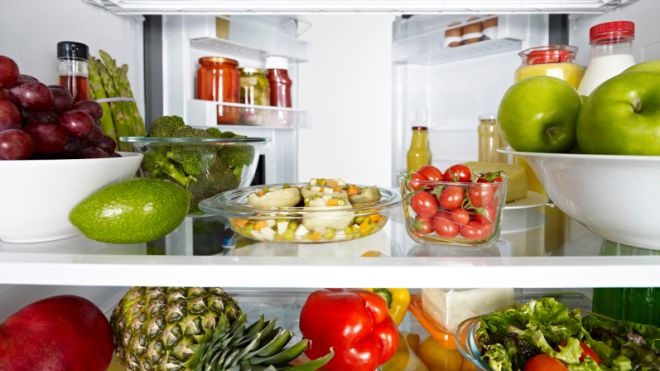
The average family throws out nearly 122 pounds of food per month and wastes $590 per year on food that eventually spoils. However, many common perishables remain safe way past their sell-by dates. From milk and eggs to produce, find out which storage tips will do the trick and try these tips to make food last longer. And for an easy reference you can keep on your fridge, download the Make Food Last Longer Guide.
Fresh Herbs
DO: Wrap in paper towels to absorb moisture, and place in a plastic bag in the crisper drawer.
DON'T: Refrigerate basil, which is damaged by the cold; stand it in water on a sunny windowsill.
Eggs
DO: Store eggs in their original container on a refrigerator shelf. This will make them last for three to four weeks past the sell-by date.
DON'T: Store eggs on the door, where eggs are vulnerable to temperature fluctuations.
Lunch meat
DO: Store meat in the meat compartment—it is specially designed to keep cool air in and can help meat last three to five days past the sell-by date.
DON'T: Forget to reseal the package.
Tomatoes
DO: Store cherry and grape tomatoes in their original containers in the refrigerator. Ripen large varieties on the counter—cold temperatures halt color, flavor, and nutrient development. Once bright red, store them in the fridge.
DON'T: Place ripe tomatoes near vegetables, as they give off ethylene.
Hard Cheese
DO: Wrap in moisture-proof plastic or foil. This will help it keep two to four months past the sell-by date.
DON'T: Throw it away at the first site of mold. If the outside of hard cheese has visible mold, trim off the mold and a half-inch area of cheese below it.
Yogurt
DO: Store yogurt at around 39 degrees F, an appropriate temp for your fridge. This will help it keep 10 to 14 days past its sell-by date.
DON'T: Be deterred by separation—simply stir and enjoy.
Milk
DO: Hit the dairy aisle right before checking out to minimize the amount of time milk is left unrefrigerated, and store it on a shelf pushed far back, where the air is coldest.
DON'T: Store it closer to or on the door; the air tends to be warmer there.
Alliums (onions, shallots, garlic)
DO: Store in a warm, dry place like your countertop.
DON'T: Place them near ripening fruits; alliums contain strong sulfur compounds, which taint other produce when kept in close vicinity. Also, don’t store them in the fridge—exposing them to cold and moisture will initiate rotting and rooting.
Watermelon
DO: Ripen on your countertop for about a week, which nearly doubles the melon’s lycopene and beta-carotene levels, according to a USDA study. Pop it in the fridge a day before eating.
DON'T: Store it near other fruits. Watermelon is easily damaged by ethylene, a gas released by fruits that speeds up deterioration. (Ever wonder which is the healthiest summer fruit, strawberries or watermelon? Click here to find out.)
Mushrooms
DO: Place unwashed mushrooms in a paper bag in your refrigerator. Keeping them cold and dry disfavors bacterial growth and the paper bag protects against dehydration.
DON'T: Wash prior to storage.
Stone Fruits (nectarines, cherries, plums, peaches)
DO: Ripen on the counter and transfer to the refrigerator. To prolong the life of stone fruits, remove their pits and boil the fruits in simple syrup for a few minutes, cool, and store in an airtight container in the freezer.
DON'T: Refrigerate these fruits while they’re still firm or they’ll never ripen.
Grapes
DO: Store in their original ventilated plastic bag, remove bruised or damaged fruit, and wrap with paper towel to absorb excess moisture that promotes mold growth.
DON'T: Wash until right before eating; doing so in advance encourages mold development.
Leafy greens
DO: Pat them dry before storing, as excess moisture contributes to decay. Wrap in paper towels, place in a plastic bag, and store in the crisper.
DON'T: Keep them in close proximity to ethylene-producing fruits like tomatoes.
Berries
DO: Store in their original clamshell containers, which increase ventilation. Remove bruised or moldy berries from the batch; they’ll speed up decay among the rest.
DON'T: Wash berries prior to storage for the same reason as grapes.
Apples
DO: Store in plastic bags in the refrigerator crisper to lock in moisture. Puréed apples mixed with sugar keep well in the freezer, as do slices of apple that have been sprinkled with lemon juice to prevent browning.
DON'T: Store near vegetables, which can be damaged easily by the ethylene the apples produce.
Potatoes
DO: Keep baking potatoes like Yukon Golds or Russets in a cool, dark place and store smaller varieties like red potatoes in the fridge.
DON'T: Store baking potatoes near direct sunlight, which stimulates the growth of a toxin that can be dangerous in large amounts. Also keep smaller-size potatoes away from apples and pears, which will take on the tuber’s earthy flavor.
Asparagus
DO: Refrigerate them upright with the bottoms wrapped in a damp paper towel and a plastic bag loosely covering them.
DON'T: Submerge these green sprigs in water; this method actually increases bacteria growth, hastening decay. Click here for 8 Awesome Asparagus Recipes.
Carrots
DO: Remove leafy tops to prolong storage. Peeled baby carrots can go anywhere in the fridge, but larger carrots with skins are much more sensitive to ethylene.
DON'T: Store large carrots next to fruit—after a week or two they’ll become bitter and nearly inedible due to the ethylene from the fruits.
Which packaged goods aren’t packed with preservatives? Find out the 100 Cleanest Packaged Foods.
source : http://www.foxnews.com/health/2013/05/20/money-saving-tips-to-help-stretch-shelf-life-your-food/